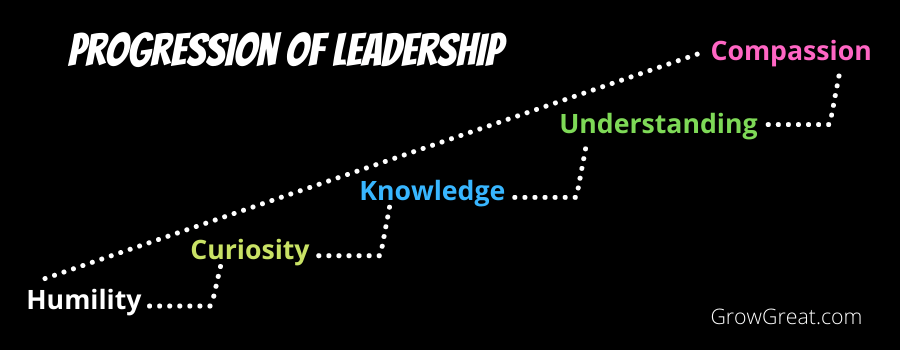I don’t remember when I sketched out this progression. It was many years ago, sparked by my frequent witness of too many people who were all the smartest people in the room. I knew that wasn’t possible. There were simply too many of them.
My teen years working for various tyrants had a big impact. I learned how critical humility was for effective leadership. I also learned that any idiot can become boss, but it takes a special kind of humanity to become a leader. And being the simple person I am (due mostly to not being so bright), I defined leadership with one word: influence.
Lifelong curiosity imposed on me the urge to find out more about people. To ask. Then listen. It was clear to me that unless or until a body did that, how could you possibly learn anything? Much less understand it?
I put compassion at the top because that was another term defined in simplicity as “a focus on others.” At some point, because of that truth – a focus on others – I made it not so much a progression as a loop. And endless loop that continues…and continues…and continues. Until we die.
We stairstep the progress. Then we drop back down to begin again. But that’s really inaccurate because we embrace each of these things simultaneously during our lifelong journey toward becoming better leaders. We can’t risk losing a single step. Or taking any of them for granted.
Humility fosters curiosity. Where there is a lack of humility, there is pride – the enemy of leadership (influence). Humility demands we face our limitations and realize that there are many things we simply don’t yet know.
Enter curiosity – asking questions with the purpose of figuring things out. When we cease being curious, pride has crept in to spoil the progression. Every leadership failure I’ve experienced happened during such moments.
Knowledge is learning. Knowing facts. Accepting evidence. It’s not the same thing as understanding though. Understanding helps us make knowledge come to life. It makes things usable.
Without understanding there is no compassion. Only judgment. Too few seek understanding. Because it’s hard. Judgment is easy. With judgment, we’re able to think whatever we want to think. Never mind the truth.
The progression is an endless loop because that focus on others is necessary at every step. It’s not merely in the pinnacle of compassion. It’s also in humility. And curiosity. Then knowledge. And understanding.
I use this progression every single week in all my leadership coaching. It’s not profound. Nor is it Harvard Business Review worthy. But it’s practical, real, honest, and true. Mostly, I know it works.
